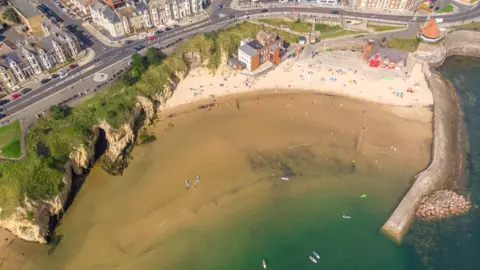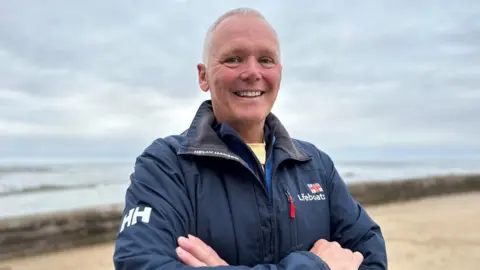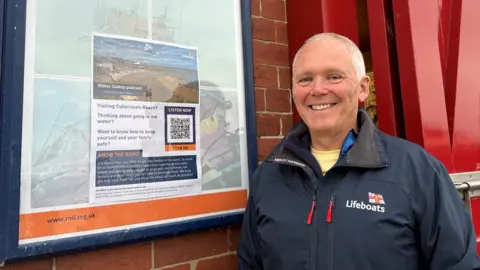Cullercoats beachgoers urged to listen to RNLI podcast
 Getty Images
Getty ImagesPeople heading to a North East beach are being urged to listen to a new RNLI podcast, said to be the first of its kind.
Water safety officer Geoff Cowan recorded the 16-minute long episode to help people enjoy Cullercoats safely.
Elements of the advice had "without a doubt been the difference between life and death" previously, he said.
Mr Cowan believes it is the first time the lifeboat charity has made a podcast about a specific beach.
The retired lifeboat man, who received a British Empire Medal for his many years of service, said there had been a large increase in the number of people paddle boarding, kayaking and open-water swimming at Cullercoats.

"We thought it would be a good idea to put a few things together to give tips and advice on how people can stay safe," he said.
He said the bay was a "fantastic location" and the most important thing was people have fun.
But he said there had been a number of call-outs which could have been avoided if people had followed safety advice and had the right kit.
Top tips include:
- Check weather and tides, which are roughly in a six-hour cycle
- If swimming use a brightly coloured tow-float and cap
- Swim at lifeguard-patrolled beaches and stay between the relevant flags
- Wear a wetsuit at all times of the year as it gives both buoyancy and warmth
- Wear a buoyancy aid when paddle boarding or kayaking and have a phone in a waterproof pouch
- Keep clear of the lifeboat ramp and be prepared to clear the area if there is a call out
Mr Cowan said a mobile phone was a "valuable aid", adding: "There have been several occasions where people got into difficulty and having a phone in a pouch has been the difference between life and death."
The podcast also recommends people use the Royal Yachting Association's SafeTRX app to log their position and raise the alert if they fail to reach their destination.

Mr Cowan said knowing the float technique was hugely important.
To float, a person should:
- Tilt their head back with their ears submerged
- Relax and try to breathe normally
- Move their hands to help stay afloat
- Spread their arms and legs to improve stability
He said there had been a call out to a girl about half a mile off the beach at South Shields who was unable to swim but knew how to float.
"Even though she couldn't swim she was able to keep herself afloat and she survived," Mr Cowan said.
He also said people should not stay in the water too long and be aware that the North Sea, which is typically around 12C, is colder than it may sometimes appear.
 Getty Images
Getty ImagesCold water shock could be "much greater" going from a "lovely warm day to cold water" and wearing a wetsuit "definitely makes a difference".
People are also advised not to jump off Cullercoats' pier, a practice known as tombstoning, Mr Cowan said.
More advice can be found online or at the lifeboat station, which is holding its annual harbour day celebration from 11:00 BST until 15:00 on Saturday.

Follow BBC North East & Cumbria on Twitter, Facebook and Instagram. Send your story ideas to [email protected].
